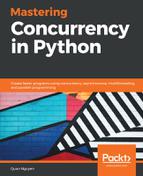Before we jump into the API from concurrent.futures, let's discuss the theoretical basics of asynchronous threading/multiprocessing, and how it plays into the framework of the asynchronous programming that asyncio provides.
As a reminder, we have three major elements in our ecosystem of asynchronous programming: the event loop, the coroutines, and their corresponding futures. We still need the event loop while utilizing threading/multiprocessing, to coordinate the tasks and handle their returned results (futures), so these elements typically remain consistent with single-threaded asynchronous programming.
As for the coroutines, since the idea of combining asynchronous programming with threading and multiprocessing involves avoiding blocking tasks in the coroutines by executing them in separate threads and processes, the coroutines do not necessarily have to be interpreted as actual coroutines by Python anymore. Instead, they can simply be traditional Python functions.
One new element that we will need to implement is the executor that facilitates threading or multiprocessing; this can be an instance of the ThreadPoolExecutor class or the ProcessPoolExecutor class. Now, every time we add a task to our task queue in the event loop, we will also need to reference this executor, so that separate tasks will be executed in separated threads/processes. This is done through the AbstractEventLoop.run_in_executor() method, which takes in an executor, a coroutine (though, again, it does not have to be an actual coroutine), and arguments for the coroutines to be executed in separate threads/processes. We will see an example of this API in the next section.
